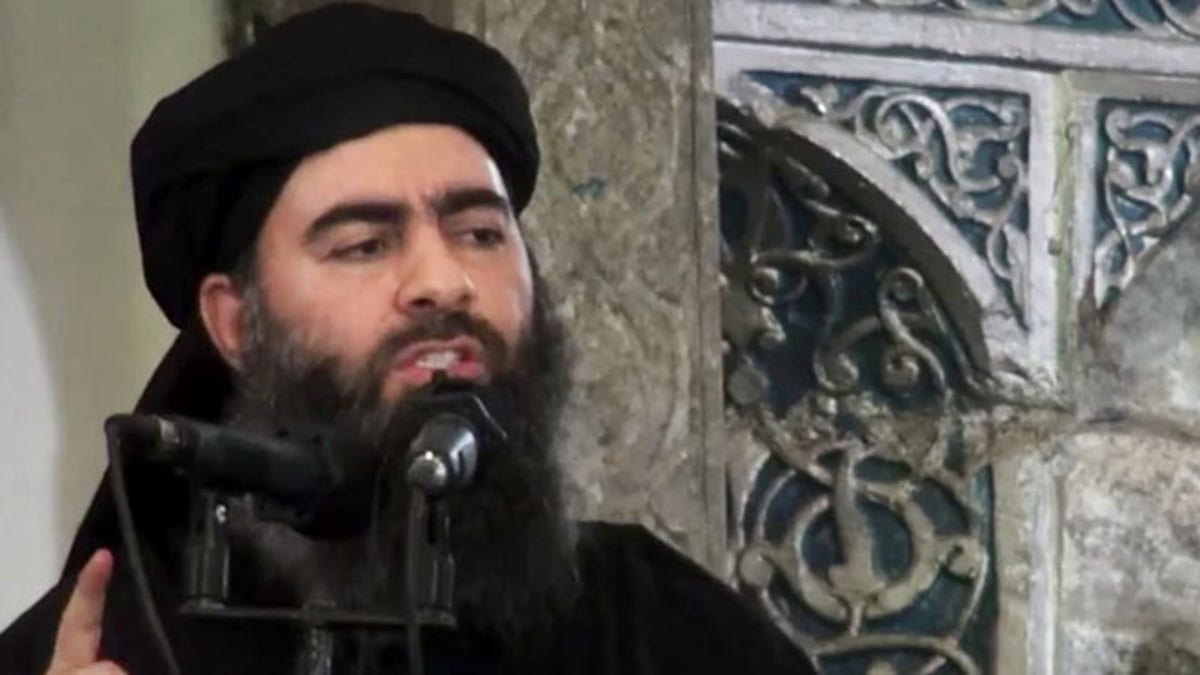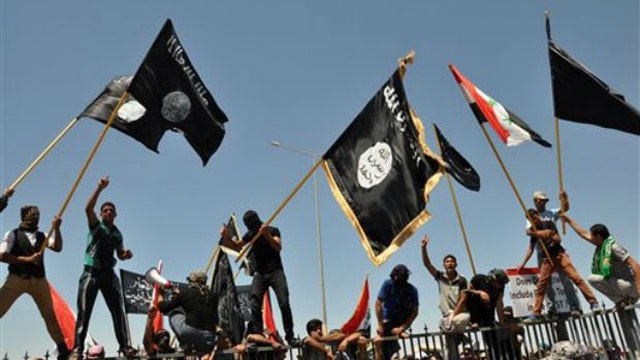Eric Shawn Reports: Will ISIS win?
Amb. John Bolton on the pending fall of Ramadi and the Anbar province
Islamic State is marking its first year as a self-proclaimed caliphate by calling on sympathizers around the world to take up arms and commit acts of terror.
It was on June 29, 2014 that the terrorist army then known as ISIS announced it had established a government run by a medieval version of strict Islam in territory that spanned northern Syria and Iraq.
Since then, the group has metastasized throughout the region, recruiting locals and foreign fighters alike and blazing a trail of death and misery. With the beginning of Ramadan on June 17, the terrorist organization has issued a call for stepped up attacks in the Middle East and around the world.
“The ISIS' Ramadan message specifically preaches that jihad is 10 times more obligatory during Ramadan and that those who die in jihad will be rewarded by Allah ten times as much as during the rest of the year,” said Ryan Mauro, national security analyst and adjunct professor of Homeland Security for the Clarion Project.
“There will be ISIS supporters who have waited to strike until now in order to get the maximum award and those who were considering an attack and will now feel more pressure to actually do it.”
“Within Ramadan, the date when ISIS declared its Islamic State caliphate is easily the most significant.”
The terror group officially announced the formation of its own government and named its leader "Caliph Ibrahim," Abu Bakr al-Baghdadi, on June 29, 2014, making that date significant, according to Mauro and Mohammad-Mahmoud Ould Mohamedou, deputy-director and academic dean of the Geneva Centre for Security Policy. They believe the anniversary and the Ramadan call could combine to make the coming days extremely dangerous
“Within Ramadan, the date when ISIS declared its Islamic State caliphate is easily the most significant,” Mauro said. “That is the day that an ISIS supporter is most likely to want to honor with bloodshed.”
Yet another factor making the coming days especially dangerous is the day marking America's own birth, July 4. A former Pentagon official told Fox that ISIS views Independence Day as a key target, and that ISIS is “more committed” than Al Qaeda to striking on symbolic dates.
Recently designated by the U.S. State Department as the world’s most dangerous terror organization, the Islamic State has had tremendous “victories” in the last year, Mohamedou noted, securing 21 pledges of allegiance or expression of formal support by groups around the world.
ISIS has within just one year established franchises and built terrorist alliances in Libya, Yemen, Nigeria and Egypt, Mohamedou wrote in the Middle Eastern journal, Al-Monitor.
Other notable feats by the terror organization, include the attacks in France in January, in Tunisia in March, in Yemen in April and twice in Saudi Arabia in May; the recruitment of more than 25,000 fighters from some 100countries; its use of the full spectrum of social media to recruit new members, inspire existing ones, as well as release in multiple languages near-daily HD-quality videos with fast-paced Hollywood-style editing and video game-inspired imagery, Mohamedou said.

Islamic State leader Abu Bakr al-Baghdadi warned against unauthorized social media accounts speaking for ISIS. (Reuters)
Al-Adnani said in a recent audio message that jihadists should make Ramadan a time of "calamity for the infidels ... Shi'ites and apostate Muslims."
"Muslims everywhere, we congratulate you over the arrival of the holy month. Be keen to conquer in this holy month and to become exposed to martyrdom," he said.
On Friday, a terrorist attacked in France, where a man was beheaded in an attack on a U.S.-owned industrial gas factory; in Tunisia, where a lone gunman killed at least 37 people on a tourist beach, and in Kuwait City, where a Shia mosque was attacked.
The State Department recognized the growing threat from the Islamic State in its June 19 annual "Country Reports on Terrorism”, documenting a 35 percent increase in terror attacks around the world over the last year.
While five countries – Iraq, Pakistan, Afghanistan, India and Nigeria - have bore the brunt of some 60 percent of terrorist attacks – there is a growing threat in the U.S. from “home grown” terrorists.
The government foiled 71 plots to attack the U.S. since 9-11, three plots just within the month of June, according to David Inserra, research associate for the Davis Institute for National Security and Foreign Policy at the Washington DC based The Heritage Foundation.
Inserra, who specializes in Homeland Security and Cybersecurity related incidents, said the U.S. is facing a period of the greatest terrorists activity since 9/11.
“This is the most intense period since the September 11, 2001 attack on the United States,” Inserra said. “All nine plots seen this year have been in support of the Islamic State.”
While much of the efforts to protect Americans from terrorists have been focused on preventing them from entering the U.S., a number of individuals who are U.S. citizens have been radicalized here, Inserra said.
The most recent plot against the U.S. involved Justin Sullivan, who was arrested by the FBI on Monday after the agency said he attempted to provide material support to ISIS and planned his attack for sometime between June 21 to 23.
“Sullivan was planning to attack a public venue, such as a bar or a concert, with a rifle in support of the Islamic State (ISIS),” said Inserra.
Sullivan’s was the 60th plot or attack since 9/11 involving a homegrown terrorist, meaning one who was radicalized here in the U.S, Inserra said.
Earlier in June, the FBI’s Joint Terrorism Task Force in New York City arrested Munther Omar Saleh and charged him with providing material support to the Islamic State (ISIS).
“Saleh and two co-conspirators were conducting reconnaissance on various landmarks around New York, had downloaded and studied plans for building a bomb, and told a confidential source that they were planning an “op” in New York,” Inserra said. “Saleh and one co-conspirator were arrested early in the morning on June 13 after charging with knives at a police vehicle following them.”
Another co-conspirator, Fareed Mumuni, was arrested on June 16, but not before trying to stab an FBI agent who had come to arrest him, Inserra said.
“When interviewed after his arrest, Saleh said that his group planned to bomb a location, use a vehicle to run down police officers, and then use their weapons to attack others,” Inserra said.
While the FBI has asked Americans to be vigilant and report any suspicious activity, Mauro said on important U.S. American holidays such as Independence Day, Americans need to be especially so.
“The Islamic State supporters view an attack on July 4th as being as legitimate as an attack on any other day but the day's parades and crowded events make it a tempting day to strike, especially during Ramadan,” Mauro said.
“ISIS as a whole does not put more emphasis on July 4th over any other holiday but ISIS terrorists who decide that now is the time to die are likely to prefer the holiday for added impact.”
Together with the recent release of State Department research showing a spike in global terrorism in 2014, the U.S. must come to grips with the true nature of the terrorist threat, which is at both home and abroad, Inserra said.
“Terrorists are living amongst us. U.S. citizens are being radicalizing here at home. We have to be vigilant, rely on community leaders to help identify threats, and provide law enforcement with the all the legal tools it needs to protect American citizens.”








































